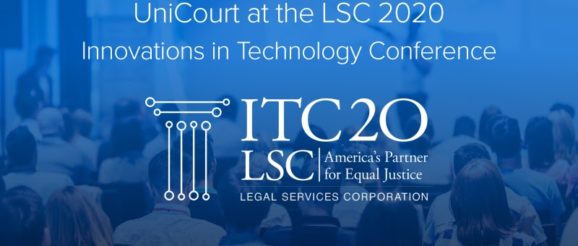UniCourt Heads to the LSC 2020 Innovation in Technology Conference | UniCourt Blog

Legal innovation has taken on many varying shapes and forms across the legal industry, and in the access to justice space, it’s more than just a buzzword, it’s a necessity.
Since 2000, the Legal Services Corporation (LSC) has held its annual Technology Initiative Grant Conference, which was recently rebranded to the Innovations in Technology Conference in 2018. The conference is the “only national event focused exclusively on the use of technology in the legal aid community” according to LSC, and we are happy to share that UniCourt’s CEO, Josh Blandi, and our Director of Content & Data Acquisition, Jeff Cox, will be attending this year’s conference.
As a leader in making state and federal court records more accessible and useful, we’re looking forward to meeting other leaders in the access to justice arena from legal aid organizations, non-profits, law firms, law schools, and other legal tech companies, who are making legal innovation happen in their communities.
With less than a week to go, we’ve put together a list of some of the presentations and discussions we’re most anticipating at this year’s conference.
Court Data as a Strategic Asset for Research and Practice in the Access to Justice Space
Using state court data as a strategic asset in the access to justice space is a topic near and dear to us at UniCourt. As an aggregator of state and federal court data, we understand the inherent issues surrounding data quality and data standards when it comes to state courts. We’re eager to learn how access to justice innovators are using state court data to improve legal aid services and if/how they are using legal analytics and litigation trends to better uncover the legal issues impacting certain communities.
Machine Learning for Access to Justice: Digital Legal Needs Analysis + Tools
Legal technology, and more specifically, legal tech leveraging artificial intelligence and machine learning, has an incredible capacity to help solve some of the long-standing issues impacting access to justice. This discussion will center on the use of machine learning to better classify how people talk about their legal problems to then develop access to justice tools that speak the language of the end-user. This discussion will also touch on the topics of the governance and ethics surrounding using legal datasets and tools, and seek active feedback from the audience on best practices for balancing AI innovations with client and public protection.
We Can Work it Out: Breaking the Impasse Between A2J+Tech Enthusiasts and Skeptics
Of the many important discussions occurring throughout the Innovations in Technology Conference, one of the most critical surrounds the need to gather a diverse set of stakeholders together to help access to justice technology projects get off the ground and thrive. This session will explore ways to get lawyers, non-lawyers, techies, and non-techies to all come to the table to develop more rounded technology projects capable of gaining broader buy-in and more wide-scale adoption. This session will also have an active participation segment, and we’re eager to be a part of the conversation on using legal tech to develop pragmatic and sustainable access to justice initiatives.
Content: Are You Making Something Useful?
Developing access to justice tools designed for low- and middle-income Americans is an important part of meeting the legal needs of the underserved in the US. And having a human-centered design approach for content strategy, content design, and visualization is key for reaching those populations in need. We’re excited to hear from multiple experts on UX/UI, psychology, marketing, and visual design and to learn how all of these elements are being combined to rethink the design and delivery access to justice tools.
A2J Startups Panel: #RealTalk from the Founders of New Startups Working to Improve Access to Justice
Last, but certainly not least, we’re excited to attend the A2J startup panel discussion, facilitated by the one and only Nick Rishwain. During this discussion, Nick will be asking founders of new access to justice startups about their inspiration to start their companies, how they funded their ventures, how they got their first clients, what obstacles they faced, and what advice they have for other access to justice startups. Nick also solicited questions on Twitter, and received some great potential questions for the founders: Who their target audience is and how that audience was included in their design process? How transparent are their “research” parameters and how do they expect bar associations to give their access to justice tools any weight? What KPIs are they using to measure the impact of their tools?
Connect with Us
If you’re attending the 2020 Innovations in Technology Conference and would like to connect with us before or after the conference, or want to learn more about UniCourt’s products and services, please feel free to Contact Us.
